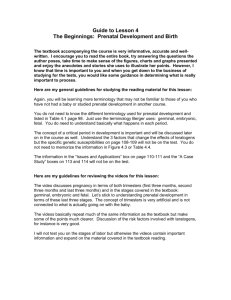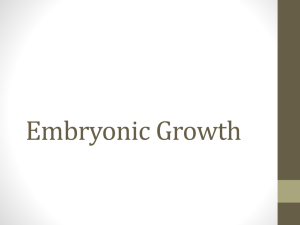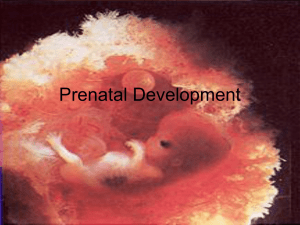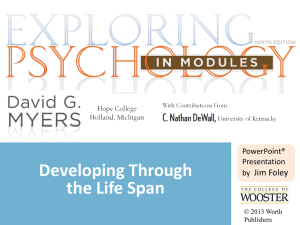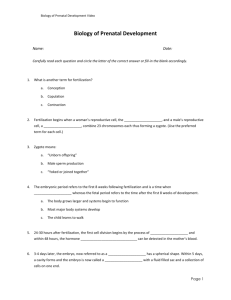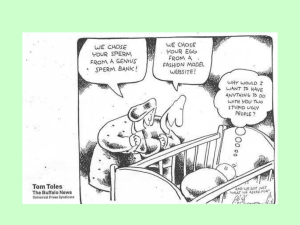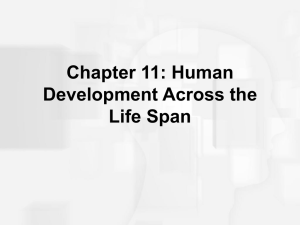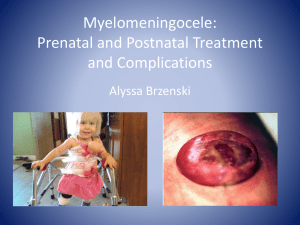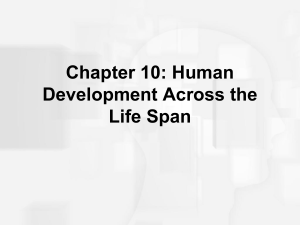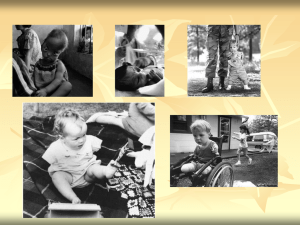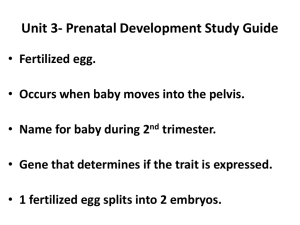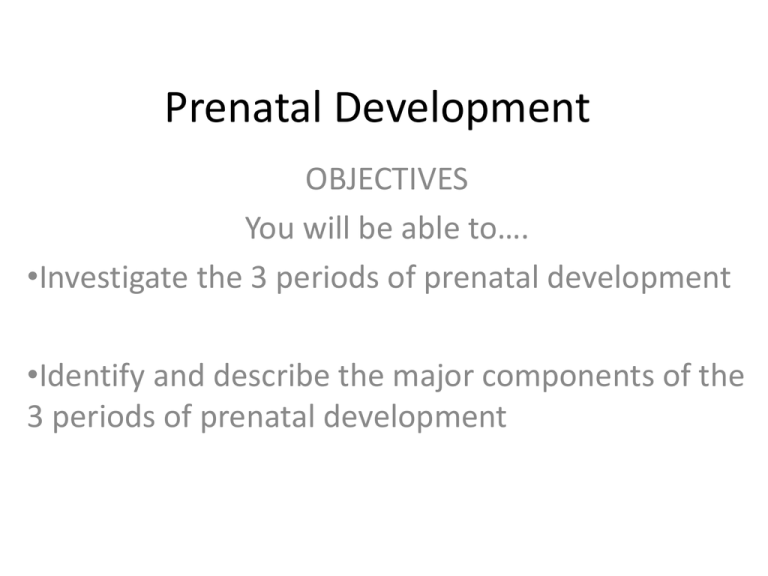
Prenatal Development
OBJECTIVES
You will be able to….
•Investigate the 3 periods of prenatal development
•Identify and describe the major components of the
3 periods of prenatal development
TRIMESTERS
Human gestation or pregnancy lasts about 40
weeks, counting from the first day of your last
normal period. The weeks are grouped into three
trimesters (TREYE-mess-turs).
1st TRIMESTER= Weeks 1-12
(germinal &embryonic)
2nd TRIMESTER= Weeks 13-28
(fetal)
3rd TRIMESTER = Weeks 29-40
(fetal)
The Germinal Period: The First 14 Days
• The zygote travels down the fallopian tube
• The zygote duplicates and multiplies
• When it grows to about 100 cells it is called a
blastocyst
• At about a week the 100 cells in the blastocyst
separate into two distinct masses
– The outer cells become the placenta
– The inner cells form a nucleus that will be the
embryo
ZYGOTE
BLASTOCYST
The Germinal Period: The First 14
Days
• Pregnancy begins at conception (joining of
sperm and egg)
• When the blastocyst embeds itself into the
endometrium of the uterus, implantation has
occurred.
• The organism will not become an embryo until
implantation is successful.
• About ½ of all conceptions fail to grow or
implant properly and thus do not survive the
germinal period
IMPLANTATION
http://www.babycenter.com/fetal-developmentimages-3-weeks
Objectives: SWBAT….
• Investigate the 3 periods of prenatal development
• Identify and describe the major components of the
3 periods of prenatal development
The Germinal Period: The First 14 Days
The Germinal Period: The First 14 Days
The Germinal Period: The First 14 Days
Summary: Germinal Period
LEFT HAND SIDE
In your own words, summarize
what the GERMINAL period
means to you.
Objectives: SWBAT….
• Investigate the 3 periods of prenatal development
•
Identify and describe the major components of the 3 periods of prenatal development
The Embryonic Period: From the 3rd
through 8th week
• The formless mass of cells becomes a distinct
being
• Embryo- the developing human from day 14 –
day 56
• A thin line ( called the primitive streak)
appears down the middle of the embryo
• This will become the neural tube at day 22
and will eventually develop into the central
nervous system, brain and spinal column
Neural Tube
• http://php.med.unsw.edu.au/embryology/ima
ges/5/5f/Neuraltube_001.mp4
• http://php.med.unsw.edu.au/embryology/ima
ges/6/68/Human_embryo_tomography_Carn
egie_stage_17.mp4
Think, Write, Pair, Share
LEFT HAND SIDE
• Why do you think the central nervous system,
brain, and spinal column are the first things to
form?
Write answer IN YOUR OWN WORDS pair up and
share with partner
Objectives: SWBAT….
• Investigate the 3 periods of prenatal development
•
Identify and describe the major components of the 3 periods of prenatal development
Pregnancy Month by Month
• http://www.babies.sutterhealth.org/babygro
wth/fetaldev/
The Embryonic Period: From the 3rd
through 8th week
• The head appears the fourth week as eyes, ears,
nose and mouth start to form
• A tiny blood vessel that will become the heart beings
to pulsate around the fourth week
• Arm and leg buds emerge around the fifth week
• Upper arms, then forearms, palms and webbed
fingers grow
• Legs, knees, feet and webbed toes can be seen a few
days later
• Each have the beginning of a skeletal structure
• Day 52-54 the fingers and toes separate
The Embryonic Period: From the 3rd
through 8th week
• The head develops first in a cephalocaudal patternHead to Tail
• The extremities (arms and legs) grow in a
proximodistal pattern- Near to Far
• At the end of 8 weeks, embryo weighs about 1 gram
and is 1 inch long.
• It has all basic organs and body parts (except sex
organs)
• It’s movements are frequent about 150 times per
hour but such movement is random and
imperceptible.
• http://embryo.soad.umich.edu/carnStages/sta
ge20/stage20.html
INTERESTING STUFF!
On left hand side
Write down something interesting or surprising
that you learned about the EMBRYONIC PERIOD
Objectives: SWBAT….
• Investigate the 3 periods of prenatal development
•
Identify and describe the major components of the 3 periods of prenatal development
The Embryonic Period: From the 3rd
through 8th week
The Embryonic Period: From the 3rd
through 8th week
The Embryonic Period: From the 3rd
through 8th week
The Embryonic Period: From the 3rd
through 8th week
Summary: EMBRYONIC PERIOD
on left hand side
• Write down IN YOUR OWN WORDS a summary of
what the Embryonic Period means to you.
Objectives: SWBAT….
• Investigate the 3 periods of prenatal development
•
Identify and describe the major components of the 3 periods of prenatal development
The Fetal Period: From the 9th Week
Until Birth
• The organism is called a Fetus from the ninth
week after conception until birth
• If the fetus is a male (XY) the SRY gene triggers
the development of male sexual organs,
otherwise female organs develop
• The male fetus experiences a rush of the
hormone testosterone
• By the end of the third month, the sex organs are
visible via ultrasound (sonogram) which uses
sound waves to instead of radiation
Formation of the Genitals
• http://www.aisia.org/document/web/girl_and
_boy/www.sickkids.ca/childphysiology/cpwp/
genital/genitaldevelopment.htm
• Male gender
With the male fetus, the genital tubercle
usually creates an angle of greater than 30°
with the lower part of the spine.
• Female gender
In the female fetuses, the genital tubercle
protrudes in the same direction as the lower
portion of the spine with an angle of less than
30° relative to the backbone.
The Fetal Period: From the 9th Week
Until Birth
• The head of the fetus comprises about half of
the total body weight
• Facial features appear human in placement
and shape by the third month
• In the fourth, fifth, and sixth months the
heartbeat becomes stronger
• Digestive and excretory systems develop
• Fingernails, toenails and teeth buds form and
hair starts to grow (even eyelashes!)
14 week fetus Ultrasound
• http://www.youtube.com/watch?v=WLXpXYo
7arM&feature=related
The Fetal Period: From the 9th Week
Until Birth
• Age of Viability- When a pre-term newborn
can survive outside the womb
• 22 weeks is the current age of viability- with
intensive medical treatment
• Even with the most advanced technology, life
cannot be maintained without some brain
response.
• As the brain matures and axons connect, the
organs of the body begin to work in harmony
Question
THINK- WRITE-PAIR-SHARE
22 week is the current age of viability, with
intensive medical treatment…
What do you think a fetus that under developed
would need to survive outside the womb?
Objectives: SWBAT….
•
Investigate the 3 periods of prenatal development
•
Identify and describe the major components of the 3 periods of prenatal development
The Fetal Period: From the 9th Week
Until Birth
• The brain increases about six times in size
• Half a million brain cells are created per minute
• Might be the most important and crucial period
for brain development
• The entire central nervous system becomes
responsive during mid-pregnancy (4-6 months)
• Basic body functions like breathing, sucking, are
regulated
The Fetal Period: From the 9th Week
Until Birth
Series 1
26
WEEKS
29%
22
WEEKS
3%
23
WEEKS
17%
24
WEEKS
23%
25
WEEKS
28%
Age of Viability –
Only means life outside
the womb is possible…
Intensive newborn care is
necessary to keep the
neonate alive, healthy,
and free of disabilities.
The Fetal Period: From the 9th Week
Until Birth
• The last three months of prenatal life, the lungs
begin to expand and contract
• The fetus begins to exercise breathing muscles
by swallowing amniotic fluid as a substitute for
air
• Heart valves mature
• Arteries and veins throughout the body also
mature
World’s Tiniest Babies
http://www.cbsnews.com/2300204_162-10010544.html
The Fetal Period: From the 9th Week
Until Birth
• The relationship between the mother and
child intensifies during the final three months
• The mother’s sounds, tastes for food, and
behavior patterns become part of the fetal
consciousness
• Auditory communication from mother to child
begins at the 28th week and improves each
week as fetal hearing becomes more acute
The Fetal Period: From the 9th Week
Until Birth
• The fetus startles and kicks at loud noises
• Listens to mother’s voice and heartbeat
• Is comforted by rhythmic music and
movement
• If the mother is fearful or anxious, the fetal
heart beats faster and body movements
increase.
Carousel Activity

